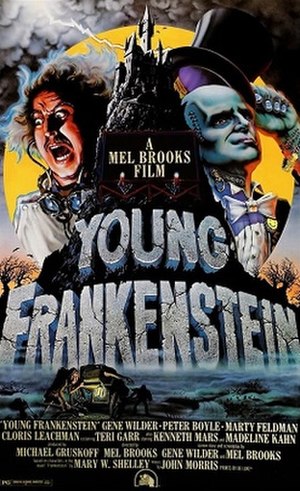
- Image via Wikipedia
Well, I’m annoyed. {Link corrected, sorry… –>} Stephen Downes’ post at least is plain and short, and simply reports Donald Clark’s own ideas about Moodle: e-learning Frankenstein. Yes, I remember the line from Young Frankenstein, when Gene Wilder discusses Frankenstein’s pronunciation: Franken-steen or Frankenstein? But that does not come into this case. Exactly like Clark’s points. They don’t really address LMS’s real issues. They just expose a culprit. Also, they don’t really help me understand what is the future of LMS’s and of Moodle.
First, let me say I admire and follow Downes’ work. Also, I am a friend (but not an adviser!) of Martin Dougiamas‘, Moodle’s head.
I sort of feel like in the middle of the ancient fight between creator and critic. Movie directors know it well: a few cynical words from the critic-du-jour and their work (often hard, thought-out work, albeit not necessarily *great*!) and there’s no queue at the movie theater. Artists have known it all along: cultivating the right folks was and still is a good means to ensure their work gets understood. Somebody creates, somebody else critiques. We, the people, use.
Back to Clark’s ideas.
First, when talking about one technology or tool, we must not forget there is always a power struggle behind. If you criticize Moodle, for instance, are you perhaps helping out Blackboard? Yes you are, even if you’re not aware. And, talking about BB: Why Clark’s piece is on Moodle and not on BB?
Of course, like every critic protected by the Free Speech (in the US and other territories) Clark has a perfect right to say what he deems fit. The point is he does so in a “populist” way. Then, when one reader points out Moodle is actually great, he says ok, “it’s all good”,
[…]it’s a fascinating piece of software and a meteoric trajectory across the mess that is the LMS market. Didn’t really want to offend anyone…
Wow.
Indeed, Moodle is pretty cheap (of course all Open Source geeks know no free software comes free of burden). Most importantly, its being free allows to invest that money which would perhaps otherwise go to Blackboard, (and then on to finance BB’s law crusades), into one’s own people.
Indeed, the OU has adopted Moodle *and* decided to build a full support system around it. It’s not Moodle which cost 6 million British Pounds. Moodle was free, had they deemed to stick just with it. Then, I have no clear info that the OU has repented its decision. However, there are thousands of institutions, big and small (some with over 50 thousand online courses!) that are enjoying Moodle’s features.
Moodle is elegant and I believe well-designed. Constructivist bubble? Ask your constructivist theorists in so many education departments around North America and check how constructivist thought is being applied. The point being: if you want to have a constructivist course with Moodle you can do it, it actually help you create such an experience for your students. If you want to create a boring uninteresting course, you can do it too. That’s Moodle’s Achilles’ heel. Let’s read again Tony Bates’ thoughts on the role of the lecture, first (More on laptops in lectures). It is inspiring. If we do not change our perspective on what a course is (and what isn’t) there’s no tool or platform which is going to save us.
Please, join Moodle’s thriving community (www.moodle.org) and discuss those issues with them. Perhaps you can help move on and overcome difficulties. Indeed, there are a few big issues with Moodle (and with all LMS’s).
I wrote earlier about Moodle’s Achilles’ heel. It may promote one pedagogy but it does not really enforce it. I also agree with Clark there’s no point in adjusting Moodle to Web 2.0 ideas and tools. Blogs from within Moodle are not the real thing, and wikis are just ok, for instance.
Still, LMS’s main issue has been discussed a lot, recently: it’s their being closed, control systems. They cannot incorporate the Web 2.0 because they are closed and they usually overemphasize content over activity. Moodle’s future perhaps must be sought by opening it up more and redesigning it up, by listening closely to the community of users and of would-be users, and to critics like Clark. I currently prefer the loose approach offered by the combination of those tools built somehow around RSS that help my students do things and talk about them without the boundaries of a platform. This is the terrain where I’m eager to engage a real, fruit-bearing discussion on LMS’s and the future of e-learning -or I should say, of learning.

![Reblog this post [with Zemanta]](http://img.zemanta.com/reblog_e.png?x-id=9fde3665-e4eb-8e2f-8e2c-edf19a0c70f2)



There are certainly a lot of details like that to take into consideration. That is a great point to bring up.
Well, interesting
post, thanks!
Donald,
Thanks for your reply. I'm glad we are on the same side. Your take seemed to me different in tone and content from what you posted here.
I think constructivism may be a good framework for teaching and learning, but not necessarily the bible it is being considered, and most importantly misapplied.
I found nice insights from Hans de Zwart on Moodle's evolution which seem really interesting: for instance his suggestions that Moodle get some inspiration from Drupal and his idea of Moodle moving toward being more of a platform, for instance as an appstore of learning activities: http://blog.hansdezwart.info/2010/02/05/the-fut…
Bit puzzled by some of the comments, as I really do like Moodle and am glad it exists. My points were trying to address the current dilemmas it faces in the market.
You say, “Then, when one reader points out Moodle is actually great, he says ok, “it’s all good””. I actually meant that. That's why I praised Enovation, LearningPool, Kineo and others. I'm on your side, really!
As for “cynical words from the critic-du-jour” I've been in this business for over 25 years long before Moodle was ever though of, and have seen LMSs come and go. However, I'm not 'selling' anything – just offering some opinions.
“Why Clark’s piece is on Moodle and not on BB?”
I didn't write about Blackboard because the post was about Moodle. It wasn't a comparison piece. As it happens I've been far more critical of Blackboard in this blog than Moodle. You may as well have asked “Why Clark's piece is not on <any LMS you may mention>. I'm always puzzled by the loose use of Counterfactuals.
“It’s not Moodle which cost 6 million British Pounds. Moodle was free” What I actually said was that “they spent nearly £6 million 2 years ago (a cool million on Moodle development alone) and that was just the pilot!” I clearly did NOT say that £6 million was spent on Moodle. The point I was making was that while Moodle may be free, it has other costs. I'm not alone in thinking that the OU work was not as fruitful as it could have been. Indeed, I gave OpenLearn a sound critique on launch.
While I agree with your observations on the weakness of current 'courses' I see the academic obsession with 'lectures' as the problem. Where we differ is in enforcing so-called 'constructivist' approaches. I say so-called because I don't believe that constructivism (as touted in education departments) is a serious or viable theory of learning.
Seriously, thanks for the comments, bit I repeat, I'm on your side and just want to see some debate on where we go from here.